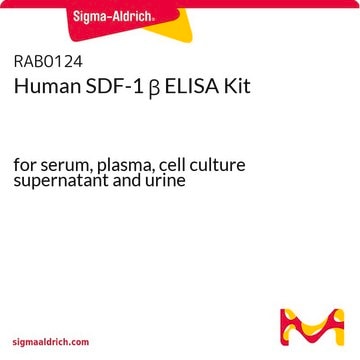RAB0123
Human SDF 1 α ELISA Kit
for plasma, cell culture supernatant and urine
Sign Into View Organizational & Contract Pricing
All Photos(2)
About This Item
UNSPSC Code:
41116158
NACRES:
NA.32
Recommended Products
species reactivity
human
packaging
kit of 96 wells (12 strips x 8 wells)
technique(s)
ELISA: suitable
capture ELISA: suitable
input
sample type cell culture supernatant
sample type urine
sample type plasma
assay range
inter-assay cv: <12%
intra-assay cv: <10%
sensitivity: 80 pg/mL
standard curve range: 93.75-6000 pg/mL
detection method
colorimetric
shipped in
wet ice
storage temp.
−20°C
Gene Information
human ... CXCL12(6387)
General description
The Human SDF-1 α ELISA (Enzyme-Linked Immunosorbent Assay) kit is an in vitro enzyme-linked immunosorbent assay for the quantitative measurement of human SDF-1 α in plasma, cell culture supernatants and urine.
Immunogen
Recombinant Human SDF-1 α
Application
For research use only. Not for use in diagnostic procedures.
Please refer to the attached General ELISA KIT Procedure (sandwich, competitive & Indirect ELISA)
Please refer to the attached General ELISA KIT Procedure (sandwich, competitive & Indirect ELISA)
Other Notes
A sample Certificate of Analysis is available for this product.
Please type the word sample in the text box provided for lot number.
Please type the word sample in the text box provided for lot number.
Kit Components Also Available Separately
Product No.
Description
SDS
Signal Word
Warning
Hazard Statements
Precautionary Statements
Hazard Classifications
Met. Corr. 1
Storage Class Code
8A - Combustible corrosive hazardous materials
Choose from one of the most recent versions:
Already Own This Product?
Find documentation for the products that you have recently purchased in the Document Library.
Endomyocardial expression of SDF-1 predicts mortality in patients with suspected myocarditis.
Zuern CS
Clinical Research in Cardiology : Official Journal of the German Cardiac Society, 104(12), 1033-1043 (2015)
The chemokine SDF-1 is a chemoattractant for human CD34+ hematopoietic progenitor cells and provides a new mechanism to explain the mobilization of CD34+ progenitors to peripheral blood.
Aiuti A
The Journal of Experimental Medicine, 185(1), 111-120 (1997)
Wnt/?-catenin pathway is required for epithelial to mesenchymal transition in CXCL12 over expressed breast cancer cells.
Shan S et.al.
International Journal of Clinical and Experimental Pathology, 8(10), 12357-12367 (2015)
Gene-environment interaction effects on the development of immune responses in the 1st year of life.
Hoffjan S
American Journal of Human Genetics, 76(4), 696-704 (2005)
HIV coreceptor downregulation as antiviral principle: SDF-1alpha-dependent internalization of the chemokine receptor CXCR4 contributes to inhibition of HIV replication.
Amara A
The Journal of Experimental Medicine, 186(1), 139-146 (1997)
Our team of scientists has experience in all areas of research including Life Science, Material Science, Chemical Synthesis, Chromatography, Analytical and many others.
Contact Technical Service









